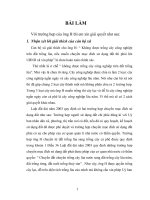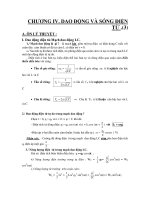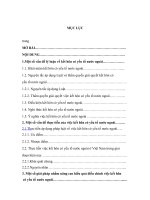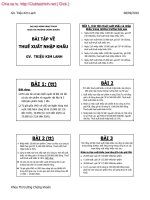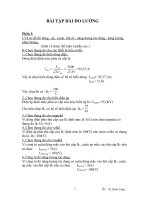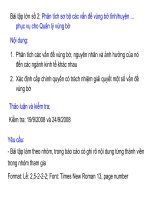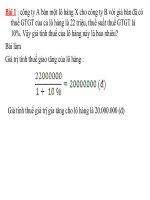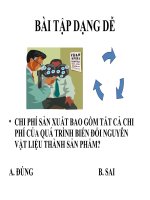Bài tập ADJ (ed/ing)
Bạn đang xem bản rút gọn của tài liệu. Xem và tải ngay bản đầy đủ của tài liệu tại đây (160.98 KB, 5 trang )
TINH TU CHI PHAM CHAT
1/ TÝnh tõ chØ phÈm chÊt kh«ng thay ®ỉi theo gièng vµ sè cđa danh tõ.
VÝ dơ:
- An old woman (Mét bµ l·o) & Old women (C¸c bµ l·o)
- An old man (Mét «ng l·o) & Old men (C¸c «ng l·o)
2/ VÞ trÝ cđa tÝnh tõ chØ phÈm chÊt
• Tríc danh tõ.
VÝ dơ:
- A poor family (Mét gia ®×nh nghÌo)
- Sau danh tõ, nÕu tÝnh tõ cã bỉ ng÷ kÌm theo.
VÝ dơ:
- Burgundy is a region famous for its wines
(Burgundy lµ mét vïng nỉi tiÕng vỊ c¸c lo¹i rỵu vang)
- A shelf full of crockery (Mét ng¨n chøa ®Çy ®å sµnh sø)
• Sau c¸c ®éng tõ Be, Become, Seem, Appear, Feel, Get/Grow, Keep, Look, Make, Smell, Sound,
Taste, Turn.
VÝ dơ:
- He looks world-weary (Anh ta cã vỴ ch¸n ®êi)
- This event made them more optimistic (Sù kiƯn nµy khiÕn hä l¹c quan h¬n)
- This milk smells sour (S÷a nµy cã mïi chua)
Ph©n biƯt
- This waiter looks very curious (Ngêi hÇu bµn nµy tr«ng rÊt tß mß) vµ He looks curiously at his boss
(Anh ta nh×n chđ m×nh víi vỴ tß mß)
* VERBAL ADJECTION:
Được thành lập từ quá khứ phân từ (V +ed) và hiện tại phân từ (V + ing)
Tính từ tận cùng bằng ING cho biết tính chất công việc, sự việc (mang nghóa chủ động)
Ex: The film is boring
Tính từ tận cùng bằng ED cho biết trạng thái, cảm xúc của người nào đối với việc gì, điều gì (mang nghóa bò động)
Ex: I’m bored with the film
The boring film made her bored
Các cặp tính từ thường gặp:
- Interested (in) - interesting : thú vò, thích
- tired (of) - tiring : mệt mỏi
- frightened (of) - frightening : Sợ
- surprised (at) - surprising : ngạc nhiên
- amused (at) - amusing : làm vui, vui
- excited (about / at) - exciting : thích thú
- amazed (at) - amazing : kinh ngạc
- exhausted (at) - exhausting ; xấu hổ
- pleased (with) - pleasing : hài lòng
- bored (with) - boring : chán nản
BÀI TẬP ỨNG DỤNG
I/ Chọn từ thích hợp:
1. Are you (interesting/ interested) in football?
2. The football match was quite (exciting/ excited). I enjoyed it.
3. It’s sometimes (embarrassing/ embarrassed) when you have to ask people for money
4. Do you usually get (embarrassing/ embarrassed) ?
5. I had never expected to get the job. I was really (amazing/ amazed) when I was offer it.
6. She has really very fast. She has made (astonishing/ astonished) progress
7. I didn’t find the situation funny. I was not (amusing/ amused)
8. It was a really (terrifying/ terrified) experience. Afterwards everybody was very (shocking/ shocked)
9. Why do you always look so (boring/ bored)? Is your life really so (boring/ bored)?
10. He’s one of the most (boring/ bored) people I’ve ever met. He never stops talking and he never say anything
(interesting/ interested).
11. At first I thought Jake was an interesting/ interested guy, but tonight I felt somewhat boring/ bored with his
company.
12. She has really learnt very fast. She has made astonishing/ astonished progress.
13. It was very disappointing/ disappointed not to get the job.
14. Philip was exceptionally annoying/ annoyed at Joanne's behaviour.
15. I thought the program on wildlife was fascinating/ fascinated. I was absolutely fascinating/ fascinated.
16. We were thrilling/ thrilled to hear your good news.
17. It was really terrifying/ terrified experience. Afterwards everybody vv; very shocking/ shocked.
18. The journey took all day and night. They found it very tiring/ tired.
19. Did Tim feel frightening/ frightened when he saw the snake at his feet?
20. Why do you always look so boring/ bored. Is your life really
II) Hoàn chỉnh các câu trong mỗi tình huống. Dùng từ đã cho + "ing", "ed"
1. The film wasn't as good as we had expected. (disappoint)
a. The film was _____ .
b. We were _____ with the film.
2. Diana teaches young children. It's a very hard job but she enjoys it.(exhaust)
a. She enjoys her job but it is often _____ .
b. At the end of a day's work, she is often _____ .
3. It's been raining all day. I hate this weather. (depress)
a. This weather is _____ .
b. This weather makes me _____ .
c. It's silly to get _____ because of the weather.
4. Clare is going to the United States next month. She has never been there before. (excite)
a. It will be an _____ experience for her.
b. Going to new places is always _____ .
c. She is really _____ about going to the United States .
III) Hoàn chỉnh các câu sau với một trong những từ sau:
` bored/ boring interested/ interesting
amused / amusing exhausted/ exhausting
confused/ confusing excited / exciting
surprised/ surprising
1. He works very hard. It's not _____ that he's always tired.
2. The teacher's explanation was _____ . Most of the students didn't understand it.
3. I seldom visit art galleries. I'm not particularly _____ in art.
4. The lecture was _____ . I fell asleep.
5. I asked Emily if she wanted to come out with us but she wasn't _____ .
6. I've been working very hard all day and now I'm _____ .
7. I'm starting a new job next week. I'm quite _____ about it.
8. Tom is very good at telling funny stories. He can be very _____.
9. I've got nothing to do. I'm _____ .
10. Liz is a very _____ person. She knows a lot, she's travelled a lot and she's done lots of different things.
IV. Chọn đáp án thích hợp nhất:
1. I always feel …………… before examinations. (nervous/ nervously)
2. He speaks English …………… (fluent/ fluently)
3. It is an ………… book. (interesting/ interestingly)
4. He drove …………… and he had an accident (careless/ carelessly)
5. We didn’t go out because it was raining …………… (heavy/heavily)
6. The football match was very ……………… I enjoyed it. (exciting/ excitingly)
7. She tried on the dress and it fitted her …………… (good/ well)
8. He never has accidents because he always drives …………… (careful/ carefully)
9. He behaved ……………… towards his children. (strict/ strictly)
10. It’s too dark to see ……………… (clear/ clearly)
VII. Em hãy cho dạng đúng của từ trong ngoặc để hoàn thành bức thư sau.
Dear Jack,
I am staying in avery (comfort) _____________ hotel in the south of France, near a (sand)
2
_____________
beach. Unfortunately it is very (wind)
3
_____________ and the hotel itself is very (expense) _____________
4
.
Another problem is that the chef can’t cook very (good)
5
_____________. The food is rather (grease)
6
_____________ and I am (hunger)
7
_____________ most of the time because I have great (difficult)
8
_____________ in
finding anything (suitably)
9
_____________ on the menu.
However, I am very impressed by the (beautiful)
10
_____________ of the surroundings and the (kind)
11
_____________ of the people. It is true that I suffered a bit a from (boring)
12
_____________ but I always do when I’m
not (full)
13
_____________ occupied. Sometimes I feel (sleep)
14
_____________ in the middle of the day and have s short
nap, which I am very (thank)
15
_____________ for. Unfortunately I sleep quite (bad)
16
_____________ at night because
the people in the room next to me snore (terrible)
17
_____________.
Anyway, I’m leaving this Friday. The drive back will (probable)
18
_____________ take me two or three days, as
long as the traffic isn’t too (bad)
19
_____________. I’ll get in touch (immediate)
20
_____________ when I get home and
maybe we can arrange to meet up for a meal.
See you soon,
Grace
I. Hoàn tất các câu sau với trạng từ thích hợp:
1. David Beckham is a good soccer player. He plays soccer very …………
2. My father is a safe driver. He drives …………
3. She is a skillful tennis player. She plays …………
4. My mother is a slow cyclist. She cycles very …………
5. I am a bad swimmer. I swim …………
6. These children are quick runners. They run …………
1/ well 2/ safely 3/ skillfully 4/ slowly 5/ badly 6/ quickly
VIII. Em hãy cho từ trái nghĩa của từ trong ngoặc ở những câu sau.
1. Last year Mr. Hoang drove very …………………. . (CAREFULLY)
2. Lan always cycles……………… to school. (QUICKLY)
3. My brother plys badminton…………… .(BADLY)
4. Mrs. Nga’s son always gets up ………………… . (EARLY)
5. Nhung’s brother always comes home …………………… . (QUIETLY)
6. This is very ………………… (football match. (BORING)
7. It’s very ……………… to swim there. (SAFE)
8. Was Linh …………………at the tennis game last Saturday ? (PRESENT)
9. It’s ……………… for Trang to lean how to cycle. (EASY)
10. The match was between two…………… teams. (AMATEUR)
IX. Em hãy viết lại những câu sau sao cho nghĩa không đổi.
Ví d :ụ 0. He is a careful driver.
He drivers carefully.
1. Long is a bad swimmer.
Long swims………………………………………………………………………
2. My brother cycles slowly.
My brother is………………………………………………………………………
3.Mr. Cuong plays table tennis well.
Mr. Cuong is…………………………………………………………………………
4. Mrs. Chi is a quick typist.
Mrs. Chi types……………………………………………………………………
5. Thoa sings smoothly.
Thoa is…………………………………………………………………………………
6. Miss Lan is a fast runner.
Miss Lan runs………………………………………………………………………….
7. Mr . Hung is a safe driver.
Mr. Hung drives………………………………………………………………………
8. Minh’s sister dances marvelously.
Minh’s sister is………………………………………………………………………
9. Mrs. Oanh cooks well.
Mrs. Oanh is………………………………………………………………………………
10. Khanh is a fluent English speaker.
Khanh speaks………………………………………………………………
IV. Em hãy chuyển những tính từ sau sang trạng từ rồi đặt câu với trạng từ đó.
Ví dụ : 0. careful carefully
My father drives very carefully.
1. slow 6. late
2. heavy 7. strong
3. good 8. hard
4. fast 9. possible
5. beautiful 10. fluent
7.4 Cách sử dụng to get trong một số trường hợp:
7.4.1. To get + P2
get washed/ dressed/ prepared/ lost/ drowned/ engaged/ married/ divorced.
Chỉ việc chủ ngữ tự làm lấy một việc gì hoặc tình huống mà chủ ngữ đang gặp phải.
You will have 5 minutes to get dressed.(Em có 5 phút để mặc quần áo)
He got lost in old Market Street yesterday. (tình huống bị lạc đường)
Tuyệt nhiên không được lẫn trường hợp này với dạng bị động.
7.4.2. Get + V-ing = Start + V-ing: Bắt đầu làm gì
We'd better get moving, it's late.
7.4.3. Get sb/smt +V-ing: Làm cho ai/ cái gì bắt đầu.
Please get him talking about the main task. (Làm ơn bảo anh ta hãy bắt đầu đi vào vấn đề chính)
When we get the heater running, the whole car will start to warm up. (Khi chúng ta cho máy sưởi bắt đầu chạy )
7.4.4. Get + to + verb
- Tìm được cách.
We could get to enter the stadium without tickets.(Chúng tôi đã tìm được cách lọt vào )
- Có cơ may
When do I get to have a promotion? (Khi nào tôi có cơ may được tăng lương đây?)
- Được phép
At last we got to meet the general director. (Cuối cùng thì rồi chúng tôi cũng được phép gặp tổng đạo diễn)
7.4.5. Get + to + Verb (về hành động) = Come + to + Verb (về nhận thức) = Gradually = dần dần
We will get to speak English more easily as time goes by.
He comes to understand that learning English is not much difficult

